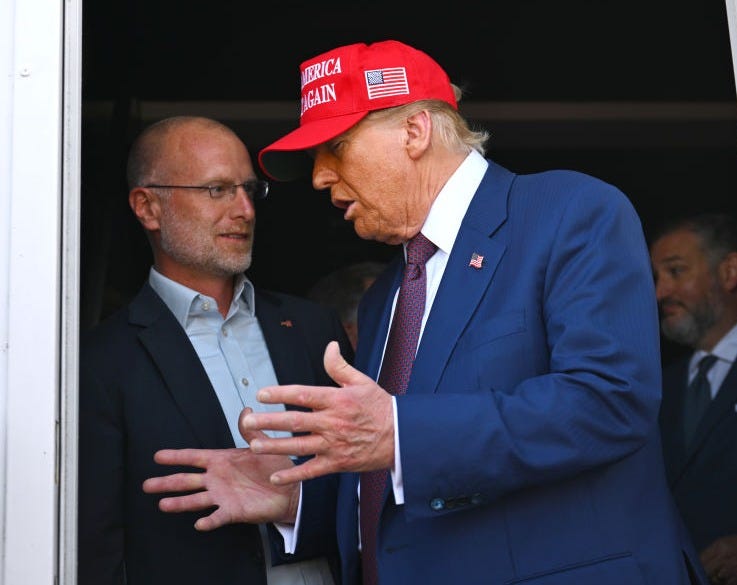
In the “Live long enough and you’ll see everything” department, Republicans have developed an interest in, among other things, what sure sounds like the Fairness Doctrine, a federal rule that Ronald Reagan’s administration eliminated in 1987, which paved the way for the rise of Rush Limbaugh and conservative talk radio – and even Donald Trump himself.
Although, spoiler alert, the goal this time isn’t really fairness.
“Broadcast media have had the privilege of using a scarce and valuable public resource —our airwaves,” Brendan Carr, President-elect Trump’s choice to lead the Federal Communications Commission, wrote on Twitter/X earlier this week. “In turn, they are required by law to operate in the public interest. When the transition is complete, the FCC will enforce this public interest obligation.”
Carr, one of the five FCC commissioners since Trump appointed him in 2017, has been outspoken about what he sees as the need for various reforms, and wrote a chapter in Project 2025, the highly controversial conservative blueprint for overhauling the government under Trump, regarding the commission. Sounding a familiar conservative talking point, Carr has accused broadcasters of bias and unfairness, and blasted NBC for violating equal-time provisions for candidates by featuring election rival Kamala Harris on ‘Saturday Night Live.’ (Bowing to those concerns, NBC provided the Trump campaign free ad time during its NASCAR coverage.)
In some respects, the idea of enforcing broadcasters’ public-interest duties looks reasonable, if perhaps hopelessly dated. Far from the days when those provisions were written, when ABC, CBS, and NBC amassed massive profits as essentially the only game in town in American television, the notion of requiring them to serve the public by providing news and information represented a logical tradeoff for the right to print money that came with broadcast licenses.
Obviously, much has changed, starting with the fact that broadcasters have seen their clout and influence dwindle in a cable-wired, digital, and then streaming world, turning them into much smaller cogs in corporate media empires. Venerable programs like CBS’ ‘60 Minutes’ or NBC’s ‘Today’ still loom large among journalistic franchises, but they have receded into the cacophony of outlets and voices, many targeted and partisan, vying for attention and ad dollars.
In addition, imposing requirements on those who dispense material via “the public airwaves” applies solely to broadcasters, meaning their sister cable networks as well as other smaller competitors face no such restrictions.
Still, Trump has always possessed what can only be called a sort-of old-man’s-view of media (beginning with his fondness for watching cable news), remaining inordinately impressed by and focused on such familiar news brands. That might explain why he howled so loudly about what he saw as favorable treatment of Harris by ‘60 Minutes,’ even threatening an absurd lawsuit as retaliation.
To fully appreciate the hypocrisy of a Republican administration engaging in saber-rattling about demanding broadcasters serve “the public interest,” let’s take a quick trip down memory lane.
Enshrined at the dawn of the TV age in 1949, the Fairness Doctrine and other early guidelines governing the TV networks saw broadcasters as “trustees” of the public airwaves and mandated, in exchange for that privilege, that political opinions on TV and radio stations must be balanced by the representation of different points of view. Yet, as former Reagan official Bruce Bartlet noted after Limbaugh’s death in 2021, “Since this was costly, it was easier for stations simply to present no opinions at all.”
Dispensing with the Fairness Doctrine paved the way for Limbaugh to sign on in 1988, shaking up the bland confines of AM radio (which was suffering, as music listeners had migrated to FM and its superior sound quality) with his stridently conservative positions and talent, as he liked to say, “on loan from God.” Even if his many imitators and acolytes weren’t equally blessed, they flooded into the pool, creating entire stations devoted to that niche.

As historians Kevin Kruse and Julian Zelizer wrote in the Washington Post, the effect was immediate and fueled an irrevocable polarization of media: “Almost overnight, the media landscape was transformed. The driving force was talk radio. In 1960, there were only two all-talk radio stations in America; by 1995, there were 1,130.”
Limbaugh also recognized that his success owed more to showmanship, to entertainment, than the old-school journalism he regularly derided, while steadfastly training his wrath at hated liberals – with nary a nod, it’s worth noting, to quaint ideas of fairness or different points of view.
Ostensibly, Reagan opposed regulations on broadcast content primarily on pro-business grounds – the argument being that what people wanted to hear and see was better left to market forces than the government. The fact unshackling broadcasters worked out so well for Republicans could be spun, in that context, as not just a blow against “liberal media” but a happy accident.
So why this newfound interest in the public interest?
